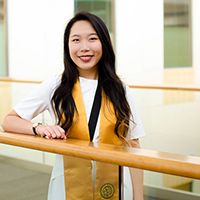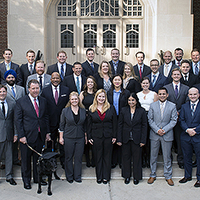 The Krannert School’s Business Information and Analytics Center, along with ITaP and Cisco, hosted a data dive competition in April that featured teams made up of students from numerous colleges and schools at Purdue. (Photo by Mark Simons)
The Krannert School’s Business Information and Analytics Center, along with ITaP and Cisco, hosted a data dive competition in April that featured teams made up of students from numerous colleges and schools at Purdue. (Photo by Mark Simons)
Diving for Solutions
Interdisciplinary teams compete to help solve real-world data problem
Cisco got a new view of some of the company’s recurring revenue streams and ideas for optimizing its return thanks to teams of Purdue students who competed in analyzing a large data set from the company.
Winning teams of students in Purdue’s third “data dive,” held at the end of April 2018, made out, too. They cashed in on $6,000 in prizes.
The Krannert School of Management's Business Information and Analytics Center, along with ITaP and Cisco, hosted the competition in partnership with Purdue’s annual Dawn or Doom conference on the risks and rewards of emerging technology.
Each team had at least one Krannert student and one non-Krannert student with a total of three to five students per team. Thirty-six finalists on eight teams presented to the panel of judges. The presenters represented four colleges and 10 majors, such as finance, computer science and industrial management. Most were upper-level undergraduates, but a team of graduate students participated as well.
Gerry McCartney, Purdue’s executive vice president for information technology and chief information officer, says the interdisciplinary nature of the teams reflects the demand for such diversity in today’s real-world business environments.
“At Purdue, one of our greatest strengths is the ability to pull from many disciplines,” McCartney says. “The data dive is an example of that and it points to the work that we expect to do in the future.”
The student teams used data from Cisco on renewals of service contracts for Cisco products. The company wanted to know how to increase service renewals, which products were more likely to result in service renewals and why. This is the second time Cisco has provided the data pool for a competition. Last year, the company walked away with a selection of business solutions related to its supply chain.
The winning team, the Savvy, received $3,000. The mix of seniors, a junior and a sophomore varied in majors from industrial engineering and applied statistics to supply chain management, as required by the competition. Lingjun Chen, the team’s leader and a previous data dive participant, says the data, and all of its 237 variables, forced the team to do its homework. Chen is a senior in mathematics and statistics.
“There were so many variables, we had to look at outside research and other common business problems to see where the data aligned,” Chen says. “The most important thing for us was to find a strategy to go at the data.”
The rest of the Savvy includes Miaoqi Liu, a sophomore in actuarial science; Mi Xiong, a senior in applied statistics; and Yiming Ding, a junior in supply chain management.
Professor Mohammad Rahman, an associate professor at Krannert and the lead organizer of the data dive, says the competitions show him that the students are learning valuable lessons in the classroom.
“They are producing insights that are meaningful and actionable for businesses,” Rahman says. “This year, there’s at least one student of mine on each of the winning teams, so they must be learning something useful.”





